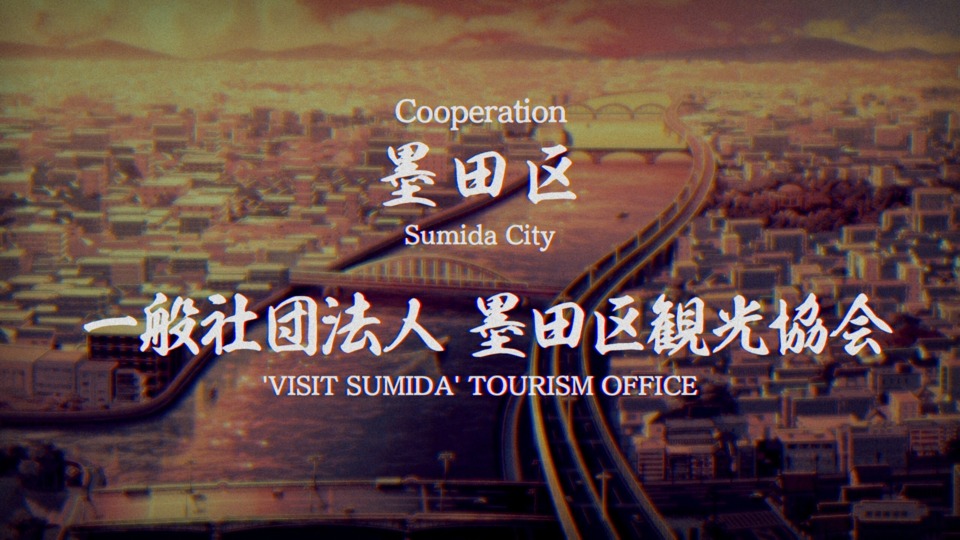Paranormasight Had TWO Best Moment/Sequence Of 2023 Candidates That Got Completely Snubbed
By ZombiePie 2 Comments
Author's Note: Warning! This blog contains MAJOR spoilers for Paranormasight: The Seven Mysteries of Honjo! If you have even the slightest interest in playing this game, play it first before continuing on with this essay.
It Bummed Me Out Seeing Paranormasight Get Zero Love During Every Single GOTY 2023 Discussion
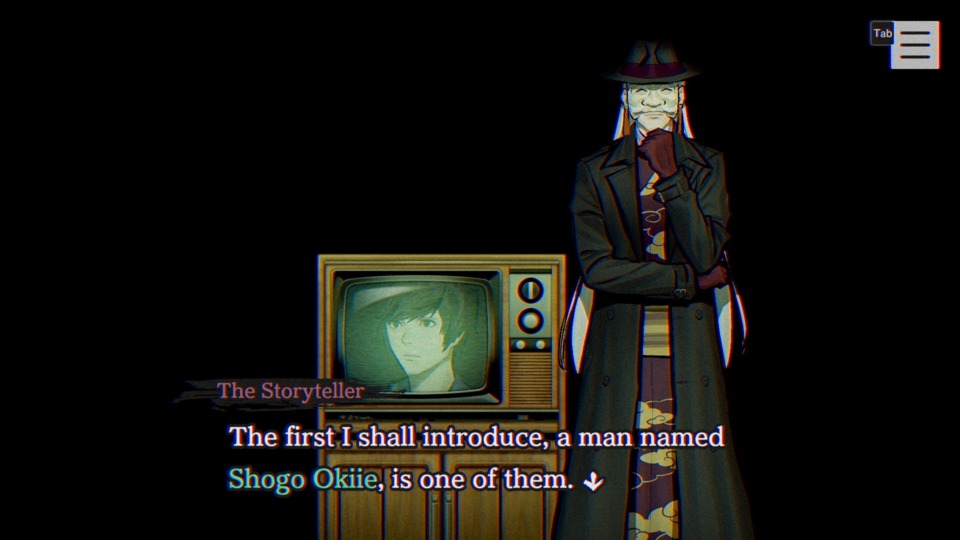
We may be outside of the realm of GOTY discussions at this present juncture. Still, there are a couple of 2023 gaming-related experiences I wanted to share in writing before I fully transitioned into other video game blogging efforts. One of these involves my general disappointment with Wo Long and exhaustion with Team Ninja's inability to progress beyond the above-average bar they set with Nioh. This time, however, I'm talking about a game I helped strong-arm onto the #4 spot on the Giant Bomb Moderators' Top 10 Games of 2023 list, Paranormasight: The Seven Mysteries of Honjo. Paranormasight is a game I wasn't too surprised to see not get mainstream attention from the gaming press during 2023's GOTY content maelstrom. Still, its absence in any awards talk speaks to the incredibly high barrier for visual novels to meet to get even the slightest traction from gaming awards-bestowing circles. As a longstanding fan of the genre, it always seems like one visual novel per year is allowed the courtesy of getting massacred by venerable titans in the industry, and they always come from the Western indie scene, which I'm not trying to slander. The vast majority of those games deserve commendations and praise, but I cannot help but question if there is a massive bias AGAINST non-Western visual novels in the mainstream gaming press.
In 2024, the remake of Tsukihime will get a worldwide release, largely thanks to the explosion of popularity surrounding Type-Moon's fighting game efforts. Melty Blood: Type Lumina is the game that broke the dam in getting Melty Blood and French-Bread on the main stages of major fighting game event. It has been a true blessing for us Japanese visual novel fans. While a lot of people are willing to talk to me about the absurdity of Neco-Arc, most are entirely at a loss when I start rambling about what happens with the lives of Shiki Tohno or Arcueid in Tsukihime. Things are finally improving the world of Fate/stay night thanks to the announcement of an official worldwide release of the remaster of the first Fate/stay night visual novel. All of this preamble is to clarify that Paranormasight's localization genuinely warmed my heart. Seeing Square Enix go the distance to take a smaller-scale game and give it a quality translation with multiple platform releases to boot was a welcomed change of pace.
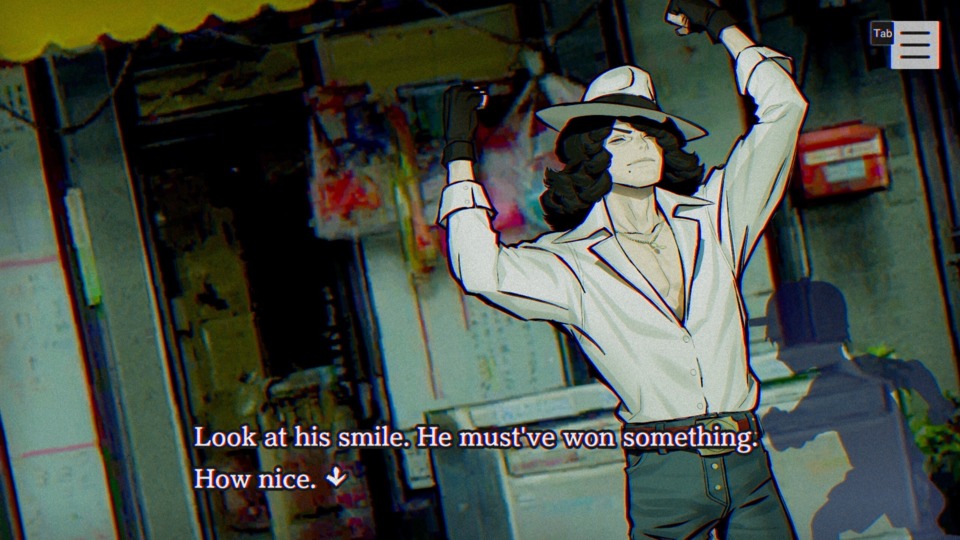
A wise person once said that beggars can't be choosers, but it also helps that there's so much going in Paranormasight's favor, and I believe it got zero credit for it. First, with everyone buzzing about "vibes" in 2023, Paranormasight's utilization of filters and a CRT-like look entirely flew under the radar. The tomes of compellingly written character biographies, Japanese parables, and myths were great scene-setters and expertly crafted into the game's structure, like 2022 hype pieces, Signalis and Elden Ring. If you enjoyed reading text logs in Signalis or weapon descriptions for fun worldbuilding clues in Elden Ring, Paranormasight scratches those same itches. The ways Paranormasight deviated from the standard Japanese visual novel conventions by having you dynamically scan its foreground and background as it plays with your perspective feel like one of its MANY tactical responses to those that dismiss traditional visual novels as being silted slideshows. If anything, its high point, its prologue, is a massive Parthian Shot to those who might be expecting that from it.
Paranormasight Is One Of The Greatest Representations Of Bubble Economy Era Japan
I have always bristled against the fetishizing of Japan on the internet. I have to say; if I see one more person on this website opine about Iwata taking a pay cut in light of layoffs in the industry, I'm going to lose my shit. Congratulations on finding the one CEO to grace corporate Japan with somewhat of a heart for their employees, but don't think that they represent the norm. But even then, Iwata was entirely acting in lock-step with government regulations that make it incredibly difficult for massive corporations to cut staffing as they do in the United States and elsewhere, and mark my words if those were not in place, those Iwata quotes would be a lot less cute. You are a goddamn idiot if you think corporations and business culture in Japan are more civil or less corrupt than wherever you live. If you want any evidence, you should read up on the "Iron Triangle" that dominated Japan from the post-war era until the global recession. And let's not forget that Japan has a forest notoriously known as a place where burnt-out business people wander into to kill themselves. That's not a stunning indicator of Japanese corporate culture. Suppose you are wondering why I'm spending an entire paragraph on the incredibly shady underbelly of Japanese corporate culture and politics. The reason is that it's a topic Paranormasight addresses head-on and with incredible tact. Some of its characters are born into the power structures and points of corruption that exploded in Japan at the height of the 80s and 90s Bubble Economy.

Before anyone pushes back on me for penning what some may perceive as having a pro-American or Western bias, let me share one part of my life that I might not have made clear in the past. I am part Japanese. My mother is the daughter of a Japanese woman who was raised in Hiroshima before moving to Kamakura, narrowly avoiding the dropping of the atomic bombs, and eventually fell in love with an American soldier during the occupation and conceived of my mother and uncle in an American military base. She eventually immigrated to the United States, where she ultimately became a naturalized citizen, and, upon the premature death of my biological grandfather, she re-married a Japanese-American man who lived in the internment camps during World War II. I grew up and was born into traditional Japanese cultural norms, even though I was and still am a primarily white, cis-gendered male. I also butted against Japanese expectations of cultural hegemony and its strict adherence to hierarchy, both of which I think are not social or economic substrates to aspire towards.
Nonetheless, only some sources of Japanese-made media tackle the seedier elements of the Bubble Economy era of Japan's history outside of the Yakuza games. In the case of Paranormasight, it does a phenomenal job of underscoring parts of Japan that were caught in a vice in trying to embrace modernity while also trying to preserve its cultural roots. The game's backdrop, Sumida, Tokyo, is leaping into post-war industrialization in some parts and gasping for air in others. There's a fun part wherein you can visit a Japanese candy shop or Dagashiya, and the game and its characters make the point that small family-run stores are a dying breed and the real "next big things" are chain stores and vending machines. There's another quick moment when two characters mention bonding over a game of bowling, which, in-game and in the real world, exploded in popularity in the 80s as the new hip thing to do because it came from the West. These are friendly callbacks to those who remember the 80s and 90s and might recall the "big in Japan" phrase and how much Japan was obsessed with conforming to Western notions of hipness and style despite the opposite effect happening in the West. Nonetheless, as the Japan in Paranormasight attempts to automatize its factories, commercialize every facet of its retail sectors, and explore new avenues for corporate dominance, it pollutes the waters of its canals, fosters cutthroat business cultures, and permeates a milieu of resentment and nihilism. But it's all in the name of getting a leg up on the West, and that's all that matters, right?
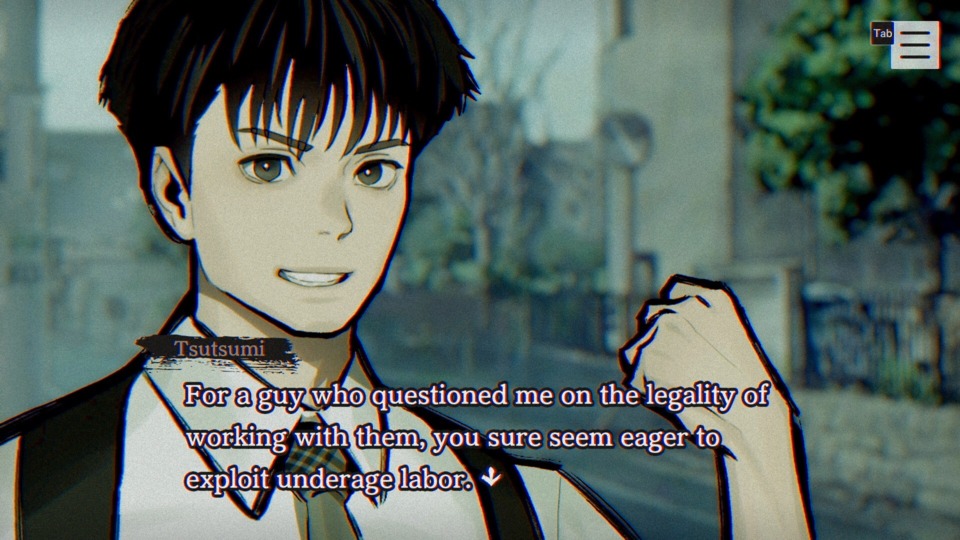
Many characters in Paranormasight dream of leaving the city they reside in and have called their home. To them, their home acts like a jail, and it has existed for generations. Once you go beyond the surface with characters like Harue Shigima and Tetsuo Tsutsumi, you recognize that the worst elements of the city, while empowered by the supernatural, are a reflection of a dog-eat-dog world wherein people get left behind and desperately look for quick fixes to change that. The filth and grime that echo in the background quickly reveal itself to be a profoundly corrupting force, but one that rewards just enough for most to keep going, which makes the world of Paranormasight all the more open-minded to the supernatural. People want to wish away problems instead of facing them, and every character you meet has at least one issue they wish they could make disappear at the drop of a hat. You know they have baggage, even worse when you discover what they are hiding; some characters are monsters, even worse than the supernatural spirits they control.
Paranormasight's Prologue Is INCREDIBLE And A Best Moment/Sequence Of 2023 Candidate!
When discussing games that make a great first impression in 2023, Paranormasight is at the top of that list. When you take control of your first playable character, Shogo Okiie, you find them entertaining a woman they are attempting to romance. The woman in question is named Yoko Fukunaga, and she claims to be investigating ghosts, spirits, and a legend associated with bringing back the dead. During a night-time investigative effort, the two end up clashing with spiritual forces that your protagonist has doubted for almost the entirety of the game up to that point. Shogo can thwart what he initially suspects is an attempt by one of these spirits to possess him, but he turns to discover that his female companion is dead. Upon making this shocking discovery, Shogo gets premonitions, allowing him to capture souls and go on a murderous rampage. The premonitions reward him with a relic that will enable him to curse those who turn away from him, which allows him to collect souls from those he can curse and kill. He connects these to the "Rite of Ressurection," a legend he only recently learned about from his now-dead love interest. His desire to return to the past becomes an obsession; our friendly corporate salaryman becomes a cold-blooded killer, but he doesn't make the connection about the impacts of his actions having dire and dark implications. It's almost like he thinks he's thrust into a fictitious fantasy television show or video game.
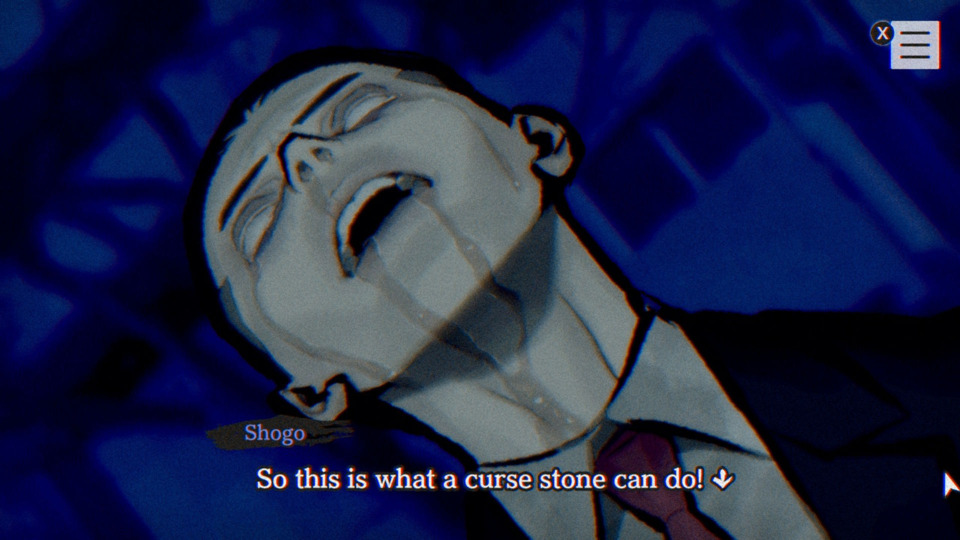
Scanning your surroundings, you notice a mysterious business-attire-wearing gentleman who locks Shogo into the first of many mental chess matches. If Shogo wants to bring his romantic interest back to life, this man must die, but for that to happen, you must engage with dialogue choices and puzzles that cause them to break their guard and allow you to accomplish your monstrous goal. It doesn't help that the people who inhabit the streets of Sumida at night seem to be more knowledgeable of the forces at play than you. The guard that demands that you surrender your relic understands what these objects can be used for and the myths and legends surrounding them. Worse, they know that you have limits to your ability to curse people, and as you attempt to cue them into your quirk, they are in progress in opting you into theirs. The dialogue is a mixture of a timed mission and a puzzle where you need to apply authentic intuition. After you find the correct prompts and cues to convince this lone figure to turn away from Shogo, you off them and absorb their soul into the ghostly vessel that beckoned to Shogo moments ago. With one use of Shogo's curse under your belt, it is time to become an unconditional serial killer. As I said before, Shogo still believes he's in the right as it is all in the name of him bringing someone he cherishes back to life, despite his actions very clearly resulting in further misery and death to others.
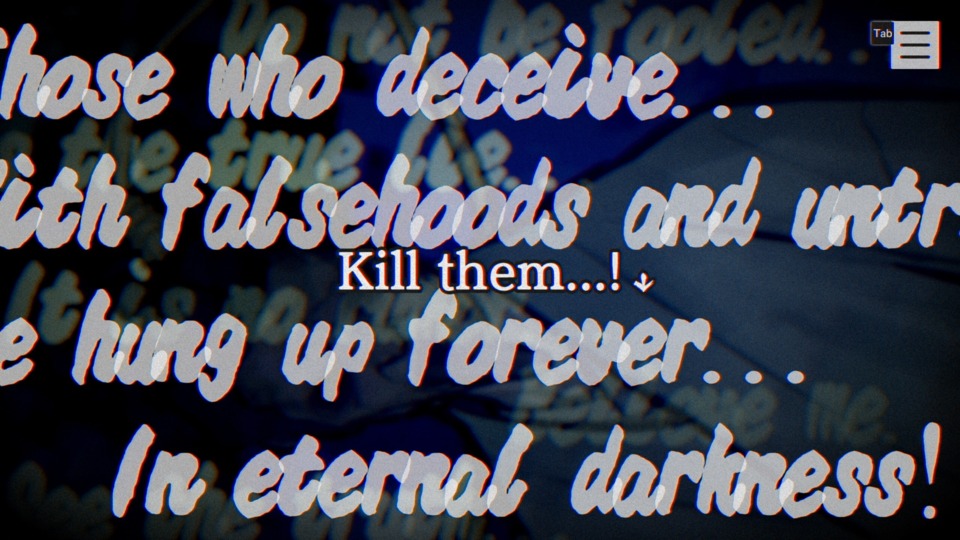
The stakes ratchet up after this "trial run." With his goal all but crystalized, Shogo begins exploring his surroundings, hoping to find other "Curse Bearers" under the belief that cursing them will reward more soul dregs. The game becomes an open-ended adventure wherein you can encounter other characters however you see fit, albeit within limits. In execution, the prologue opts you into more one-on-one mental chess matches AND introduces characters that will persist beyond the game's prologue. The first time you run into Harue Shigima, she lays out her cards and immediately tells you that if you don't give her your relic, she's torching your ass, and she is being literal. For most of you, your failure to figure out what is allowing her to murder Shogo forces you to pick up on subtle context clues on what her curse might involve and what exactly you are doing to enact it. The real highlight comes when you encounter a shitty young adult whose curse involves you listening to a song before you are crushed to death. When you figure out that his curse only works when you can hear the game's audio, the solution involves going into the game's menu and revising the game's sound settings to 0. The game plays around with the fourth wall, thanks to its highly active omnipotent narrator that interjects whenever your playable characters meet an untimely demise, but authentically tying the game's basics into a puzzle skyrockets it well above most games that break the fourth wall with a wink or nod to the camera before moving on being the standard.
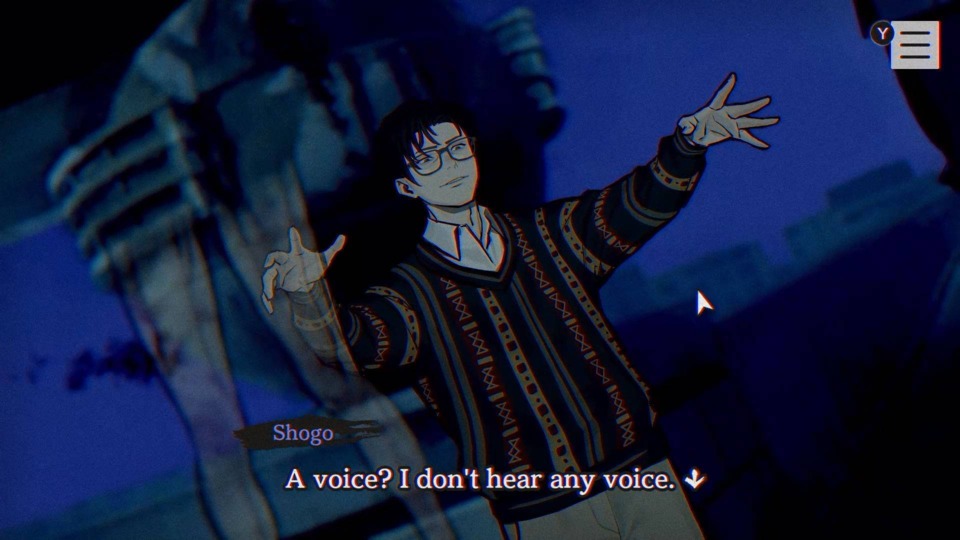
Watching a typical salaryman become a murderer without connecting the dots is one thing, but what ramps Paranormasight's opening salvo to where I think it deserves more recognition for having a "Best Moment" candidate comes in how this all concludes. After laying waste to what feels like at least a dozen innocent civilians, Shogo's attempts at resurrection don't pan out as they hope. Furthermore, upon exploring an alternate route wherein they don't perform a ritual that ends up resulting in Yoko dying, the game cuts to dawn to show Shogo dead in the streets of a park. The person we thought would be our primary protagonist has been thwarted off-camera and likely by a different Curse Bearer. One mystery transitions to another, and the moment you see Shogo's storyline shut off on the game's hub world, only to make way for three new characters, two of which you just moments ago MURDERED, is such an effective use of the omnibus format that seems ingrained in the visual novel genre. Paranormasight is not the first game that offs the character it put front and center on its box art in its first act, nor will it be the last. Nonetheless, it is such an efficacious use of the Psycho plot twist you cannot help but applaud it. Leaving no stone unturned results in some wild and wacky non-canonical routes, but that's standard with the genre, and Paranormasight playing into that is one of its greatest strengths.
Yes, The Game Loses Its Tempo In The Middle, But The Characters Carry It!
Paranomrasight has often been criticized for being a top-heavy game. After making a phenomenal first impression, it slows its pace to introduce a flurry of playable characters, some of which work better than others. The game's second act completely removes the cursing gameplay element in favor of a more traditional visual novel structure. Outside of clicking on items in the foreground and background, most interactivity stems from placing characters in the right place at the right time and selecting dialogue prompts that opt you into new story branches and environments. There's no doubt that this is a rude awakening to those with qualms with the slideshow nature of visual novels, but there's more to Paranormasight than you may think. Nonetheless, I agree with the general sentiment that the game spends more time than necessary setting up its story and a cavalcade of plot twists with each main character. The number of fetch quests you complete with Yakko Sakazaki and Mio Kurosuzu is unconscionable.
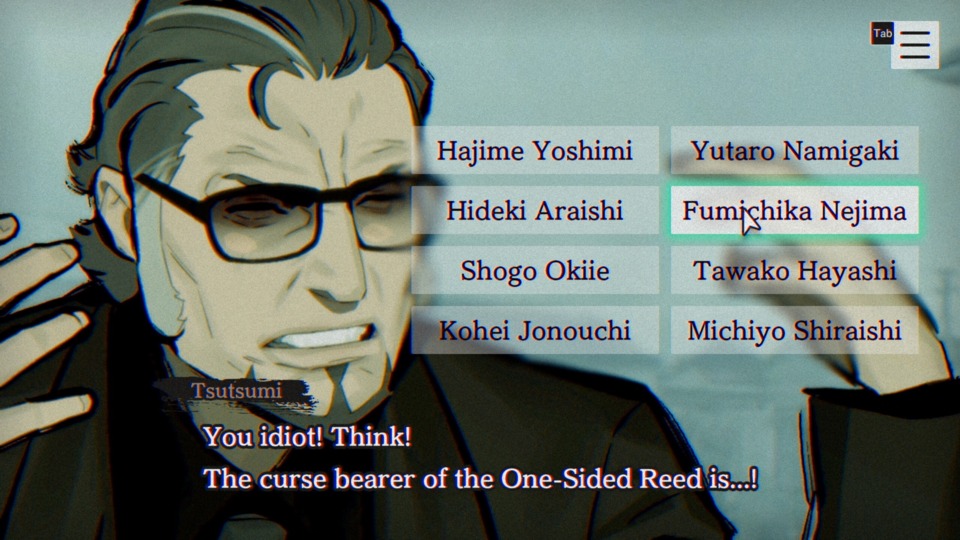
Yet, there's once again more to Paranormasight than meets the eye. During my GOTY review, I mentioned being nonplussed by Stray Gods and disappointed with how inconsequential most of your choices feel. Worse than needing to stomach professional voice actors' strain under the demands of their singing responsibilities is how little a majority of your decision-making impacts the routes you get throttled toward. Someone off-site challenged me to consider that this issue also bedevils Paranormasight. And as I said to them, and will say here, Paranormasight makes good on presenting you as a participant in an investigation and making you interact with natural investigative gameplay hooks along the way. My absolute favorite comes in the handful of times when you reach deal ends in the storyline and need to reposition characters into matching backdrops in the correct timeline to unlock new paths in the game's branching storyline. Additionally, how Paranormasight surfaces its dozens of possible routes and conclusions is way more transparent and narratively honest than anything Stray Gods does. You can explore secret endings whenever you'd like and without fear of needing to restart a playthrough. In fact, the game outright encourages you to try different dialogue options and tutorials you on the importance of save scumming. It all causes you to feel like you are making an in-game detective board with the game's characters.
While it sounds a bit like a cop-out, Paranormasight needs its quieter second act so its characters can better inhabit its stage. Larger-than-life characters like Richter Kai don't get to be memorable goofballs if you are sweating over whether or not you should use your curse on a person you are interviewing. And for as much as I loved trying to get characters to flinch so I could off them and get closer to the game's next phase, there's no doubt that if that persisted for even an hour longer, Paranormasight would be too high-stakes and high-strung for most to stomach. Finally, the city and the myths that dominate the underpinning of the story need time to breathe, and that's what the second act does masterfully. You can watch character profiles and encyclopedia articles dynamically transform depending on the information you collect from your in-game prompting as you scour backgrounds and press people on every possible line of questioning. If you speed through character interactions and skip non-story critical choices, you'll miss out on codex entries that put peak BioWare to shame.

But WAIT, The Game's Conclusion Is Also a Best Moment/Sequence Of 2023 Candidate!
However, quibbles with the game's middle act slowing to a crawl aside, when the narrative kicks into high gear during its last two movements, it definitively silences its critics. Not only does the game get more explicit about its blend of the supernatural with a gritty detective serial format, but it also lays out the cards to its heart. As you progress with the characters that populate the lion's share of the game's story, you explore a handful of ancillary narrative conclusions and what initially appears to be the game's canonical ending. In this route, the veteran detective Tetsuo Tsutsumi resolves his investigation involving a mass murder threat as well as his unresolved trauma with his estranged daughter. Doing so comes at the cost of his life, and as you walk away from an incredibly poignant monologue about his love for his daughter, you find yourself briefly exploring the game through the lens of his partner and a teenage mystic. However, as they set off to resolve the last niggling unresolved plot threads, Yoko, Shogo's crush from the beginning of the game, returns and reveals that she was the master puppeteer of the curses coming into existence as she is a distant descendant of their source from the Edo period of Japan. She murders both of your remaining characters before it is implied that she continues with a master plan that results in countless deaths.
Next is a desperate effort from you, the player, to see if there is any way to avoid this conclusion. There is an element of frustration here as the game only works in vagaries about where to start, and I don't want to sound as if I am equivocating that this is excellent game design; it isn't. Still, it is "trope appropriate" as it echoes a prevalent template regarding how you commonly find "true endings" in Japanese visual novels. And in the grand scheme of things, I think for as much people complain about how "cheap" this feels in Paranormasight, it works in practice. The "solution" to preventing the actual evil forces from reigning supreme is to dart back to the opening moments of the game's prologue and, after the death of Yoko, refuse to initiate the tutorial battle with the businessman. Instead, you must find a bright lantern-like spirit and jump into a portal. Here, the game's narrator returns and prompts you through a series of questions about who you are and what name you identify with.

If you remember what you clued into the game at the start, the narrator reveals that you weren't just viewing things through the lens of the characters. Instead, all those times the game played with the fourth wall were your hint that you were more than a cipher for the character's actions. The clicking and dialogue parsing that we completed for the colorful cast were us occupying the role of a different essence, the one prophesized to break the city of Sumida from its cycle of misery. This spirit once fought the evil priestess and Yoko's ancestor centuries ago. The game's narrator says that the proper "solution" for avoiding the tragedy you have witnessed is for you to shut down the spiritual element of Sumida and force the characters to realize there are no easy outs: coming to terms with death, grief, and trauma must be solved in the real world and without the help of legends of resurrection or spooky ghosts. This relief comes through hard work, wading through deeply uncomfortable life experiences, and working with those you trust. And then you watch as characters that previously sought comfort through the supernatural need to go through real-world coping strategies and work in the realm of reality in their attempts to get the conclusions they feel they are entitled to. While these end-notes are far less dramatic and fanciful, everyone is happier than when they resorted to myths and legends.

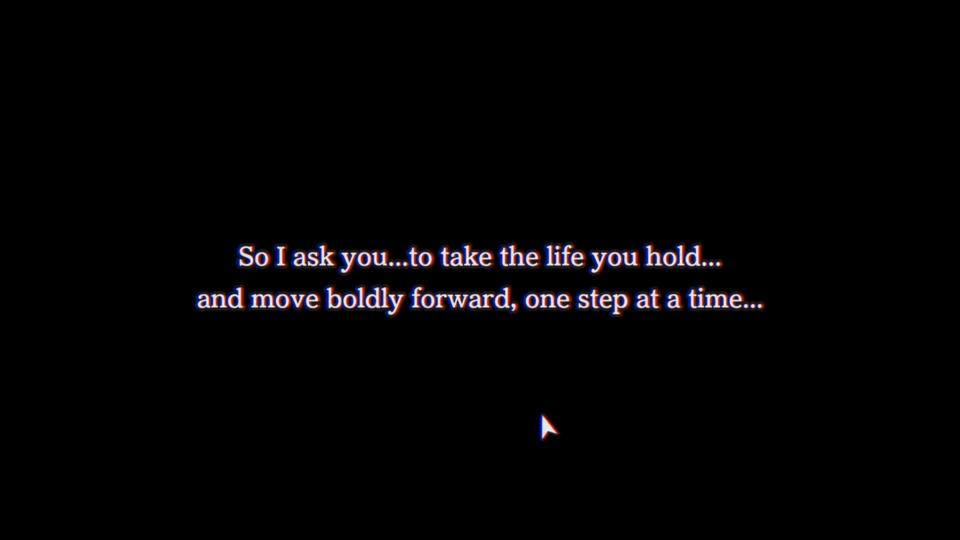
The epilogue of Paranormasight makes so many incredible points about the topic of grief and how best to attain the truth. You watch as the characters come to terms with despair, regret, and trauma through coping strategies and truth-finding efforts; they do not turn to the supernatural outside of one exception. When they break down emotionally during this sequence, it feels cathartic instead of melancholic or tragic. The two schoolgirls wanting to bring their friend back from the dead immediately recognize that they still want to find the truth behind her demise, but she will remain dead, and they have to live with that. Likewise, the mother whose son was brutally murdered, at no fault of their own, earns her emotional resolution about the facts of what happened through working with others and understanding that the truth is sometimes upsetting. There's something magical about seeing characters that often act in flamboyant and animated ways finally become comfortable in their skin and about where they can go in the future. It's an uneasy and simultaneously relatable feeling.
Paranormasight Is A Great Case Study On Square Enix's Relationship With Small And Mid-Tier Developers, But They Have To AND MUST Do Better
So, for the handful of you who have yet to give Paranormasight a shot and willingly spoiled some significant aspects of the game's story by reading this blog, I hope you try it. Even if you go into it knowing where it ends up, there are a ton of compelling storylines in between that make exploring this game worthwhile. It is a true buried treasure that acts as an incredible mid-tier game in Square Enix's portfolio, which has had a relatively mixed record with games of this scale. On the one hand, you have quality titles like Paranormasight and Little Goody Two Shoes; on the other hand, you have The Quiet Man. With Paranormasight, there's no doubt that Square Enix deserves credit for helping the game clear development hurdles to get released on mainstream platforms outside of Japan with a high-quality localization in multiple non-Japanese languages. And huge props to the hundreds of Q&A personnel they added to the mix to iron out issues. Nonetheless, there's no doubt that it feels like Square Enix sent this game out to pasture and put in the least amount of effort to get this game any positive attention.
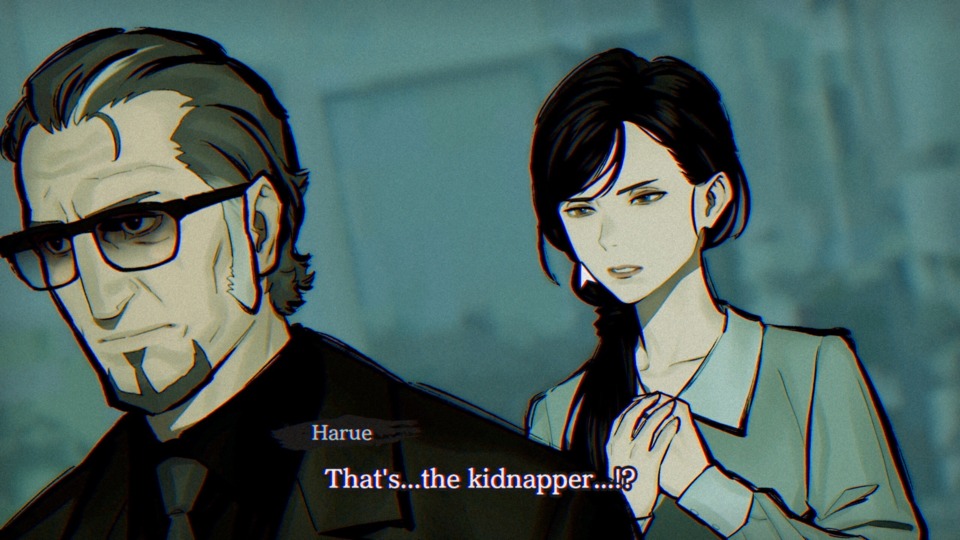
Unfortunately, this problem is familiar to Square Enix fans, especially regarding their endeavors in the visual novel arena. In 2022, Square Enix played a massive role in localizing The Centennial Case: A Shijima Story, which was an underrated gem the year it came out that Square did ZERO work bringing attention to. For pity's sake, they did a better job getting people to check out Various Daylife, a venerable piece of refuse, instead of The Centennial Case. The game was an amazingly compelling mix of FMV and traditional visual novel trappings, and despite all of that being very much in vogue thanks to Sam Barlow and the indie adventure game scene, Square Enix almost released the game in a manner that felt like it wanted to set it up for failure. That's even though The Centennial Case has a Playstation 4 & 5 release, something Paranormasight continues to lack, which sucks, by the way! For whatever reason, Paranormasight remains stuck on the Switch if you want to play it on a console. Likewise, Square Enix has traditionally not been the most voracious supporter of Game Pass, but both Paranormasight and The Centennial Case make so much sense on Game Pass.
I'm not going to sit here and claim that Paranormasight could have taken on Tears of the Kingdom, Alan Wake II, or Baldur's Gate 3. Nonetheless, this game and many others deserved much better than what they got from Square Enix. The company's CEO said they want to make its portfolio more diverse and less reliant on IPs "like the Dragon Quest and Final Fantasy franchises." It's a hilarious notion, considering this is the same company that just a few years ago let IO Interactive walk for free and sold Edios for pennies after decades of mismanagement. Regardless, if Square Enix's leadership is being serious when it says that it views the virality of Powerwash Simulator as a possible direction for the company, becoming the point man in bringing high-concept and art-house Japanese visual novels to the rest of the world seems like a good bet. There's a growing and healthy audience, regardless of whether you factor in the meme games that always take the internet by storm. Still, the explosion of the PC indie scene and ubiquity of self-publishing have made the genre far more mainstream than where things were not three to five years ago. I know I am in an armchair right now, but it honestly feels like there's a prime opportunity here for Square Enix that they are sleeping on, and I know I'm not the only person who feels this way.
